Interview With Priscilla Long
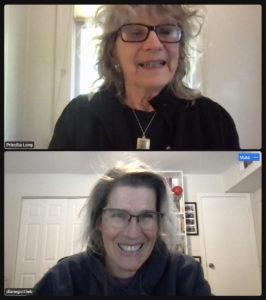
It was such a joy to meet Priscilla Long and I’m so excited to introduce her and her wonderful work to you! Priscilla’s recently released Dancing with the Muse in Old Age is a spirited, richly researched, empowering work of nonfiction. I love Priscilla’s no-nonsense approach, her zero-tolerance for ageism, and her deep respect for neuroscience, the arts, and, of course, the openings and possibilities available to us as we age. Not to mention Priscilla has recently taken up the banjo! I had the great pleasure of speaking with Priscilla recently on zoom.
Diane: Welcome, Priscilla Long, to WomanPause! I am so excited talk to you, among other things, about Dancing with the Muse in Old Age.
Priscilla: I’m very happy to be here. Thank you.
Diane: This book came at a great time for me. I wrote in a recent blog about having COVID and how it affected my brain. It was scary. But what was so interesting is that while I did lose some of the brain power I’m used to, I also became weirdly and wildly creative.
Priscilla: Oh, that’s encouraging.
Diane: It was fascinating to me how a loss in one area kind of led to a gain in another.
Priscilla: I’m not a neuroscientist, but I love neurosciences and have written about the brain, and that makes great sense to me. A loss in the part of the brain that wants to control everything contributes to greater creativity, because creativity requires a certain looseness—less of, “Oh, is this going to be any good?” So congratulations.
“We Can’t Control Our Fate, But We Can Definitely Influence Our Fate”
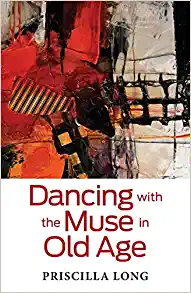 Diane: Can you sum up the book’s premise?
Diane: Can you sum up the book’s premise?
Priscilla: We need to approach old age proactively and with knowledge of the science, which often is contrary to a lot of our firmly held opinions. The reason I wrote the book is that I am turning 80 next year. It’s time for me to approach this new period of my life with knowledge and information so I can approach my next years proactively. As we know, we can’t control our fate, but we can definitely influence our fate. The book has helped me tremendously and my hope is it will help others.
Diane: What I love about the book is how it attacks ageism and that there’s so much in it about age and creativity.
Priscilla: Yeah. One of the chapters is “Peak Ages of Creativity.” There’s all this literature, which I deplore, about how the peak ages of creativity are 39, 40, 42—by respected researchers. What they’re doing is conflating recognition and fame with the artistic product. They’re sociologists. They don’t want to get into a debate about, “Is this good art?” Or, “Is this a beautiful pot, or is this a dumb pot?” I don’t see how they could do that, either. But what they’re basically doing is saying that the greatest works of art are the ones that have sold the most.
This whole discussion was started by this guy Harvey C. Lehman, who wrote back in the ’50s.
He looked at all the art books in his university library and counted the number of times each of the artists mentioned appeared in the books. The more they appeared, the greater the artist. You see the problem.
“What You Think About Aging Affects How You Age”
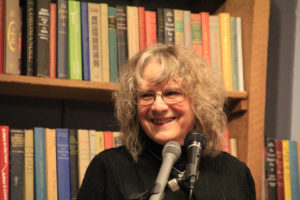 In 1950, there were no women in the art books.
In 1950, there were no women in the art books.
And people of color were not there. The art books were biased. That’s one problem. And then, of course, the second problem is how many times your poem appears in an anthology is not a measure of its worth. But people believe it is.
Another chapter is on age and happiness. You hear all this about becoming lonely, isolated, sad, and decrepit. Well, in fact, there are huge studies on happiness. Not just one little study. It’s been found, over and over again, that young people and old people are happiest.
The U-curve.
Middle age is a stressful time for many people, and that’s what that is really recording. Across cultures, across countries, this is very true. So, why is this important? Partly because what you think about aging affects how you age.
It’s not a neutral. It does matter. And that’s another piece of the science. Becca Levy at the Yale School of Public Health has done all these longitudinal studies, where people who have negative views of aging, meaning, “If you get old, you’re going to get lonely. If you get old, you’re going to be sad and decrepit,” they have much worse outcomes. It’s striking. Shocking, actually. And then there are other studies where subjects are primed (meaning words are flashed too fast to consciously perceive them) with either negative or positive words related to aging. The people who received negative words, even young people, walk slower to the elevator when they leave. They write with shakier handwriting, and they don’t remember as well. And that outcome is also the case with old people.
“A Characteristic of Older Age Is Not Caring As Much What Other People Think, And This Is Important in Making Art”
 Diane: What’s interesting about ageism is that it starts very young but doesn’t end when you get old. It would be hard not to have internalized some ageist messages.
Diane: What’s interesting about ageism is that it starts very young but doesn’t end when you get old. It would be hard not to have internalized some ageist messages.
Priscilla: We’ve all internalized ageism.
Diane: And we carry those messages with us, even about ourselves.
Priscilla: Yeah, absolutely. And what I have become so aware of is how much that affects us, our own lives and our ability to create. This is all about how do we change that.
Diane: It is.
I want to get back to something we were talking about before, the conflating success with creativity. When you’re in your 40s, how you express yourself creatively is shaped by what will bring you success. “What’s going to sell books? What’s going to get me in a gallery?” That may be more of your focus at that time in your life. The act of breaking boundaries and going beyond what is considered sellable or highly sellable at the time, we may be more likely to do as we get older because we don’t care as much.
Priscilla: A characteristic of older age is not caring as much what other people think, and this is important in making art. When you are first starting on a poem or a painting or whatever, it helps to ask what the painting needs, not what someone else is going to think of the result, when you’ve hardly started. And there are numbers of examples of artists who have loosened up in their 90s. Like Wayne Thiebaud and the new body of work he started at age 98. His clowns. I mean, they are fantastic.
“There’s Always a Point in the Middle of A Big Project Where, ‘This Just Seems Ridiculous. Whose Idea Was This?’”
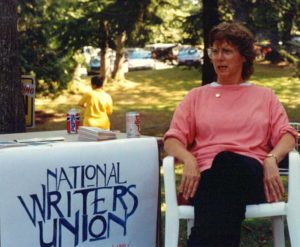 And a couple of composers. There was one composer, Elliott Carter, who composed modern classical music. He was well known among musicians because he wrote difficult music that even musicians struggled with. At the age of 90, his work became more expressive, more melodic, more open. He wrote his first opera at age 90. More than half of his entire lifetime output was done after the age of 85. He died at age 103, and all of his best works were done between age 90 and 103. What did he have to lose by just loosening up?
And a couple of composers. There was one composer, Elliott Carter, who composed modern classical music. He was well known among musicians because he wrote difficult music that even musicians struggled with. At the age of 90, his work became more expressive, more melodic, more open. He wrote his first opera at age 90. More than half of his entire lifetime output was done after the age of 85. He died at age 103, and all of his best works were done between age 90 and 103. What did he have to lose by just loosening up?
I’m almost 80. It’s not that I am not ambitious, because I am ambitious, but I’m much looser. I do not work with anxiety at this point. I just work along. I know there’s always a point in the middle of a big project where, “This just seems ridiculous. Whose idea was this?” And yet, if you’re experienced, you simply do a little bit at a time. Maybe you fix a sentence. And you get through that, and then it becomes a good piece of work.
Diane: Or you don’t get sucked into it. You’re more like, “Oh, here I am, at this part again. I know it’ll pass. I know I’ll get to the other side.” But when you’re not as experienced with that part of the journey, it freaks you out.
Priscilla: Yes. And some people quit at that point, which is sad.
So that’s one of the advantages of being an older creator. Plus, of course, there are many, many creators who have started late.
And that’s very important.
“If You Are Starting Late the Thing to Know Is That Your Past Experience in Other Areas Will Come to Serve You in Your New Endeavor”
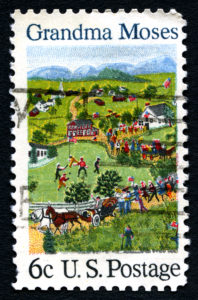 Diane: People who’ve been on this path for a while have already developed skills. They know the process. They don’t get thrown. But for people who want to experiment, try something new, or are new to developing their creative gifts, what can you say to them?
Diane: People who’ve been on this path for a while have already developed skills. They know the process. They don’t get thrown. But for people who want to experiment, try something new, or are new to developing their creative gifts, what can you say to them?
Priscilla: Let’s remember that people like Anna Mary Robertson Moses, formerly called Grandma, started painting in her 70s. And there are many others who started late. Diana Athill, for example, was a London editor. She edited Jean Rhys and other famous authors but was not a writer. And after she retired, she began writing. She wrote her second book of short stories in her 90s, and a memoir when she was 98.
If you are starting late the thing to know is that your past experience in other areas will come to serve you in your new endeavor. We have what I call meta-skills. We know better how to focus. We are better at being consistent in the work. We know how we learn and how to teach ourselves. We are better able to be compassionate with ourselves, to not beat on ourselves, an essential quality for learning!
Many creators who didn’t start late, change what they do, because I think the big challenge, if you’ve been at it for a long time, at whatever genre you’re in, is—Are you going to just repeat yourself? How are you going to go forward now?
There are people like Verdi, the Italian opera composer. He was famous for composing tragic operas and was at the peak of his career in his 40s. He fits that stereotype. The problem for somebody like that is, “How can I possibly do better than I’ve already done? Is the next thing going to be any good?”
“All of the Aging Literature Talks About Purpose”
Ursula Le Guin said that. Can I do anything more now? Am I going to just embarrass myself by doing something that’s not as good as this great thing that I did when I was 45 or 55 or 65?
Verdi took a long time to write his last work, Falstaff, which is a comedy and is totally different from his previous work.
Diane: Of course.
Most people aren’t chasing fame or recognition. The art is for themselves. What are some of the benefits of creativity?
Priscilla: Well, all of the aging literature talks about purpose. And it’s a wonderful way of life. Every new thing is a challenge. You’re not a factory producer. There’s all this learning involved, all kinds of craft learning. And then there are always communities involved with creative work. I don’t think there’s a place where there’s not a community of poets, open mics, writers’ groups, They’re all over.
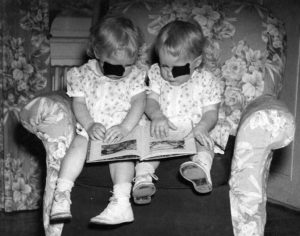 Diane: And we have Zoom. We can connect to people that we never would’ve been able to before.
Diane: And we have Zoom. We can connect to people that we never would’ve been able to before.
I loved your story about your twin sister.
Priscilla: She is a historian of technology, going back to Renaissance Italy. She is an amazing researcher. An article by her is worth a book by many. Anyway, she had this thing, ” Do not tell our age!” So I said, “Well, okay.” But then I wrote a piece titled “O is for Old.” It was an Abecedarian, and of course, if you write a piece like that, you have to say how old you are.
“One Thing the Book Does Is Find Models of People Who Are Productive and Successful and Happy and Connected and Brilliant—and They’re Not Lonely”
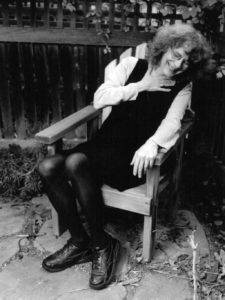 So I did, and it was published in this beautiful little magazine called Post Road. And she said, “Oh, well, that’s okay. It’s a literary magazine. Nobody reads them anyway.” Some years go by and she receives the MacArthur Genius Award. And so our age is broadcast across the world. People would write to congratulate me on my sister’s award, and then say, but they said you were 72! Well, yes.
So I did, and it was published in this beautiful little magazine called Post Road. And she said, “Oh, well, that’s okay. It’s a literary magazine. Nobody reads them anyway.” Some years go by and she receives the MacArthur Genius Award. And so our age is broadcast across the world. People would write to congratulate me on my sister’s award, and then say, but they said you were 72! Well, yes.
Diane: That’s amazing! That breaks some misconceptions about age.
Can you tell the story of the scientist who was forced to retire from Yale?
Priscilla: Yeah. John Fenn was a chemical engineer who worked at Yale, until he was forced to retire. This is back in the day when universities would force people to retire at age 70. He didn’t want to retire. He had absolutely no desire to retire. And so he went to another university, set up a lab, and did some amazing work. And he was awarded the Nobel Prize in his mid-80s. He wrote his last paper at age 90.
One thing the book does is find models of people who are productive and successful and happy and connected and brilliant—and they’re not lonely.
There’s the sprinter—Don Pellman—who broke world records over the age of 100.
Diane: Let’s talk a little bit more about memory.
Priscilla: There are these interesting pieces of research on aging and memory loss. One of them is that there are communities where elders are highly esteemed, such as villages in mainland China and the American Deaf community, where elders are highly esteemed, unlike in most of mainstream America. In those communities, old people remember as well as young people.
“I’m the Most Unathletic Person You Ever Want to Meet, But I Have Become Bonded to My Fitbit”
 The science on moving and exercise is also huge. Over and over we learn that maybe a third of dementias or memory loss, cognitive impairment, can be prevented by exercising and learning.
The science on moving and exercise is also huge. Over and over we learn that maybe a third of dementias or memory loss, cognitive impairment, can be prevented by exercising and learning.
I’m the most unathletic person you ever want to meet, but I have become bonded to my Fitbit. I do my 10,000 steps. The evidence is like, “Please do this.” The science is pretty overwhelming on that little piece.
But then, the most amazing thing to me was neuroscientist Rachel Woo’s work and studies. It’s not about cognitive maintenance but about cognitive development. Cognitive development in old people works exactly the same as cognitive development in children. What happens is that in middle age, we’re typically very busy, working, raising teenagers. We are going on our native brilliance and our experience, but we’re not learning much new. And we don’t have any time either. But then things change. The kids grow up and so on. At that point we need to rev up our learning.
Diane: Tell us about yourself. You’re a poet. I know you do a lot of different kinds of writing, but when did you start, and how long have you been at it?
Priscilla: I started keeping a journal and writing, “poems,” when I was 16. But I didn’t have a straightforward path at all. I ran a printing press until I was about 40. All that time, I would get up and write in the early morning before 7:00. Then I would go to work.
“There’s the Banjo, But I Also Decided to Learn Math–My Worst Subject”
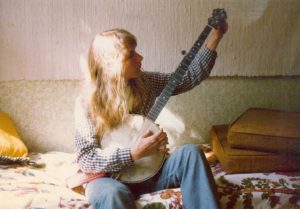 I took my first poetry course in the early ’80s. My first book was a scholarly history of the American coal industry. I researched it over many years. It’s called Where the Sun Never Shines: A History of America’s Bloody Coal Industry. All the time, I was also working on poetry. And then I went to the MFA at the University of Washington in Seattle. I started editing and teaching and writing. The rest is history, as they say.
I took my first poetry course in the early ’80s. My first book was a scholarly history of the American coal industry. I researched it over many years. It’s called Where the Sun Never Shines: A History of America’s Bloody Coal Industry. All the time, I was also working on poetry. And then I went to the MFA at the University of Washington in Seattle. I started editing and teaching and writing. The rest is history, as they say.
But I worked a long time. My first book of poetry didn’t happen until 2014, many many years after I started writing poetry (though I’d published poems in magazines).
Diane: What do you do to grow? What new and different things are you learning?
Priscilla: For one thing, I’m learning banjo.
Diane: Oh, that’s amazing.
Priscilla: I’ve thought about this. I write about very different things. I wrote a piece on the salmon in the Pacific Northwest and then a piece called “On Writing,” about the origin of writing, the Sumerians and the Aztecs and all that. Okay, those are very different types of things. But I thought, “If I’m researching salmon over here and then researching all the archeology stuff over there, does this really mean I’m learning new stuff? I’m learning new content, but research is what I’m good at. And so I question whether this counts!
And there’s the banjo, but I also decided to learn math–my worst subject.
Diane: Wow.
Priscilla: I’m in the second grade now, so thank you for your congratulations.
In math, I had the most atrocious teaching, the fourth grade teacher scolding, and so on. And also, I wasn’t interested in it.
But I open the books, and I’m amazed. It’s actually fascinating and pretty fun.
“When Things Get Difficult, Just Have a Lot of Compassion for Yourself and Keep On. Don’t Stop”
Diane: Is there anything else you wanted to mention?
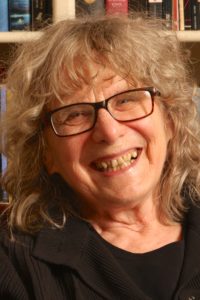 Priscilla: A couple of things. And one is that anyone who wants to begin a new creative path, you don’t need to have hours every day to do it. You need to take a half an hour, or 15 minutes if you’re very busy. Don’t say you’re going to start when such and such happens, but rather begin right away and keep going. Things always get difficult. That’s the nature of creation. It’s not so easy. And so when things get difficult, just have a lot of compassion for yourself and keep on. Don’t stop.
Priscilla: A couple of things. And one is that anyone who wants to begin a new creative path, you don’t need to have hours every day to do it. You need to take a half an hour, or 15 minutes if you’re very busy. Don’t say you’re going to start when such and such happens, but rather begin right away and keep going. Things always get difficult. That’s the nature of creation. It’s not so easy. And so when things get difficult, just have a lot of compassion for yourself and keep on. Don’t stop.
The other thing I don’t want to forget to mention is that people always say, “Oh, you must have a passion for something.” Well, that’s true, but you don’t have to feel passionate every minute. That’s not what it’s about. It’s about just consistently working on it. And it goes along. You meet people. You take a class. You just work on it some more, and that’s how it works. No big, grand, big deal.
Diane: I love those pieces of advice. They’re wonderful.
Priscilla: Thank you.
Diane: So, this has been great. I loved your book. I highly recommend it. And it’s been terrific speaking with you.
Priscilla: It’s lovely to talk to you.
As always, I’d love to hear from you. Please write a comment or send me an email.
Wishing you all the Happiest of Holidays!
See you soon!
XOXOXO
Diane

For one-on-one support in uncovering your voice on the page, please consider working with me! I’d love to join you on your journey!



I’m inspired! Thank you Diane and Priscilla.
Thank you, Michael!
Thank you Diane and Priscilla!! I love this so much. We can’t get enough of these beautiful reminders that our cultural training about aging is a bunch of CRAP. “As we know, we can’t control our fate, but we can definitely influence our fate.” I love your proactive approach Priscilla, and the way you are modeling for us how we can keep “influencing our fate” and enjoy the process. Thank you both for sharing this conversation!
Thank you, Sherry, for your comment! Our cultural training (love how you said that) about aging is CRAP!!! I love Priscilla’s proactive approach too!
Hello Sherry, Thank you so much for your encouraging comment. Yes, let us resist the ageist CRAP and enjoy influencing our fate. Have a great year ahead!
Hi Priscilla, I can hear your voice as I read this interview! The span of our friendship is precious to me. Oh, I’ve taken up spoon carving- It has a meditative aspect that I love. I also have carved a few birds and now jam spreaders. Nothing is perfect, lots of twists and bends but it sort of mimics my twists and bends. Your words always give me inspiration to keep moving on with projects. Take care. And Happy New Year.
What a lovely note, Amanda! And what an interesting new pursuit! Love “Nothing is perfect, lots of twists and bends but it sort of mimics my twists and bends” Sounds pretty wonderful to me!
Hi Amanda! I love the idea of spoon carving and how it mimics our own twists and bends. Have a terrific year ahead! Love Priscilla
A wonderful interview! I learned so much from attending Priscilla’s Folio presentation and from reading her Dancing with the Muse in Old Age book! It’s excellent “medicine” to recover from internalized agism! I’m glad Priscilla mentioned here that giving 15-30 minutes a day to creative pursuits (in an ongoing way) has power in it. I’m a huge fan and practitioner of small-scale, consistent creative work. I’ve been doing a daily drawing every day, shared with six friends (we call ourselves MAD, for Mark a Day), and daily 15 minute writing, shared with four friends, since I was 63, for nearly 11 years). It’s enormously life-enriching. Even my exercise is small scale but daily (15 minutes of stretching and weights-bearing exercises, 30 minutes of walking). One of my personal goals in retirement is to focus on creative pleasure, freedom and community. Priscilla’s book offers so much inspiration and encouragement for me, even though she and many of her exemplars are much more ambitious than I desire to be.
Mary! Thanks for sharing how you work this! One of the things I love about Priscilla’s approach is that her suggestions work for both the ambitious and the less so among us! Creative pleasure is a wonderful goal–love that–and I want to share with you that since I’ve spoken to Priscilla, I’ve begun a daily small-scale drawing practice! So fun! Yay for Priscilla and her terrific book!
Hi Mary,
Your comment is so encouraging to me. Thank you dear writer!
Love this interview. What a refreshing perspective that reframes how to approach aging.
Thanks, Tessa! What new muse will you embrace this year, my dear friend?
Tessa, Thank you very kindly for your comment! You help me to think all that work was worth it.
Thanks for this, Diane. Very interesting and encouraging, this fresh perspective.
Thanks, Fran! Priscilla is so very encouraging and I love that her insights are all backed by science!
Fran, So glad you feel encouraged!
I found this blog to be both interesting and true. Especially the part about MATH! And I needed to hear this now as I’ve been stuck on my writing. Thanks, Diane and Priscilla, and Happy New Year 🙂
I’m so glad Priscilla’s words were what you needed now, Margie! Thanks for sharing and Yes about Math!!! Happy New Year to you!
Marjorie, Happy New Year to you! And actually, believe it or not, I find math to be fascinating! (especially no pressure, no scolding, no tests, just me and math). Good luck on your writing!
I love this interview! Fills me with energy and enthusiasm. You don’t have to have “passion,” just consistent work…so true and so comforting. Thank you!
Thank you, Alison! Speaking with Priscilla was such a joy! Yay for energy and enthusiasm! Happy 2023!!
Another incredibly inspiring, informative and up lifting interview Diane! I always come away encouraged to “keep going”…15 minutes at a time…thank you Priscilla! Diane, I think a compilation of your interviews would be a wonderful book itself! While all unique, there’s a common thread that people can only learn and benefit from reading…always, always learning…thanks to you ! Happy New Year 🙂
What a huge compliment, Marian–thank you! I don’t know about a book (an intriguing idea), but I love the women I’ve had the honor of interviewing (of course, loved speaking with you!) and their words, wisdom, and courage definitely need to be celebrated! Happy New Year, dear friend!
Hi Marian, I love Diane’s other interviews too and am so grateful to be included. Happy New Year to you!
Alison, Thanks so much for your comment. Happy new year to you!